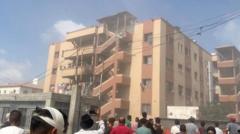How Will the UN Achieve Justice for the Gaza Hospital Attack?

Published: 2025-08-26 19:18:14 | Category: world
The recent Israeli airstrikes on a hospital in Gaza have sparked widespread condemnation, particularly after the UN demanded accountability for the attack that resulted in the deaths of at least 20 individuals, including journalists and health workers. Reports indicate that the Israeli military targeted a camera allegedly associated with Hamas, but this rationale has not quelled the outcry for justice and investigations into the incident.
Last updated: 26 October 2023 (BST)
Key Takeaways
- The UN has called for justice following the Israeli airstrikes on a Gaza hospital.
- At least 20 people were killed, including journalists and health workers.
- Protests erupted in Israel demanding a ceasefire and the release of hostages.
- Israeli Defence Forces (IDF) stated the strikes were aimed at a Hamas surveillance camera.
- Reports indicate a severe humanitarian crisis in Gaza, with famine conditions reported.
The Incident at Nasser Hospital
On Monday, a double strike on Nasser hospital in Khan Younis marked a significant escalation in the ongoing conflict. The initial strike reportedly killed one person, while a subsequent attack followed just 10 minutes later, targeting journalists and rescuers who were responding to the first incident.
Among the victims were five journalists and four health workers, all of whom were affiliated with major international media organisations, such as the Associated Press and Reuters. The UN human rights office spokesperson, Thameen al-Kheetan, expressed shock and condemned the attack, emphasising the need for thorough investigations into the targeting of journalists.
Israel's Justification and Military Inquiry
In response to the backlash, the Israeli Defence Forces (IDF) released an initial inquiry claiming that the attack aimed to neutralise a surveillance camera reportedly positioned by Hamas to monitor IDF troop movements. The IDF's statement alleged that six of the deceased were identified as "terrorists."
However, the IDF's explanations have been met with scepticism. Notably, the military did not clarify the reasoning behind launching a second strike within a short timeframe after the first. There are calls for deeper investigations into the decision-making processes that led to the attacks, including the munitions used.
International Reactions and Calls for Accountability
International condemnation has escalated, with UK Prime Minister Keir Starmer labelling the attack "completely indefensible." The UN has reiterated the importance of holding those responsible accountable, as past investigations into similar incidents have yielded little to no results.
Al-Kheetan's remarks reflect a growing frustration over the lack of accountability in Israeli military actions, stating, "These investigations need to yield results. There needs to be justice."
Protests and Calls for Ceasefire in Israel
In Israel, the aftermath of the hospital attack has sparked nationwide protests. Demonstrators took to the streets, blocking highways and holding rallies in major cities, including Tel Aviv. The protests are primarily driven by demands for the government to agree to a ceasefire and negotiate the release of hostages held by Hamas.
Israeli Prime Minister Benjamin Netanyahu has so far rejected ceasefire proposals, insisting on a different deal that would ensure the release of all hostages in one exchange. Current estimates suggest that only 20 of the 50 hostages are still alive after enduring 22 months of conflict.
Yehuda Cohen, whose son Nimrod was taken hostage in the Hamas attacks earlier this month, articulated the urgency of the protests: "Another day for protest, another day to make sure the issue of the hostages stays a high priority."
Humanitarian Crisis in Gaza
The situation in Gaza has reached catastrophic levels, with reports indicating that over half a million people are facing severe food shortages and humanitarian aid is critically needed. The Integrated Food Security Phase Classification (IPC) has classified the conditions in Gaza as "catastrophic," with widespread starvation and death looming over the population.
Israel's military operations, launched in response to the Hamas-led attack on southern Israel on 7 October 2023, have resulted in staggering casualties. As of the latest reports, at least 62,819 people have been killed in Gaza, with most of the population displaced multiple times, and essential services, including healthcare, water, sanitation, and hygiene, having collapsed.
Despite the dire situation, Israel has denied the existence of famine conditions within Gaza, labelling the reports as "outright lies." This rhetoric raises significant concerns about the humanitarian response and the need for international intervention.
What Happens Next?
The ongoing conflict and humanitarian crisis in Gaza continue to unfold, with the international community closely observing the situation. With protests in Israel gaining momentum, there may be increasing pressure on the Israeli government to negotiate a ceasefire and reassess its military strategies. The demand for accountability regarding the recent hospital attack is likely to persist, as calls for justice grow louder.
As mediators, including Qatar, await a response from Israel regarding ceasefire proposals, the future remains uncertain. Will the Israeli government acknowledge the growing calls for humanitarian considerations, or will the cycle of violence continue unabated?
FAQs
What happened during the airstrikes on the Gaza hospital?
The airstrikes on Nasser hospital in Khan Younis resulted in at least 20 deaths, including journalists and health workers. The Israeli military claimed the strikes targeted a Hamas surveillance camera.
What has the UN said about the airstrikes?
The UN has called for justice and accountability following the airstrikes, stressing the need for thorough investigations into the targeting of journalists and health workers.
How has the Israeli government responded to the ceasefire proposals?
The Israeli government, led by Prime Minister Netanyahu, has rejected ceasefire proposals from Hamas, seeking a different deal that guarantees the release of all hostages in a single exchange.
What is the current humanitarian situation in Gaza?
Gaza faces a severe humanitarian crisis, with reports indicating that over half a million people are experiencing catastrophic conditions, including starvation and lack of essential services.
How many people have been killed in Gaza since the conflict began?
As of the latest reports, at least 62,819 people have been killed in Gaza since the conflict intensified on 7 October 2023.



